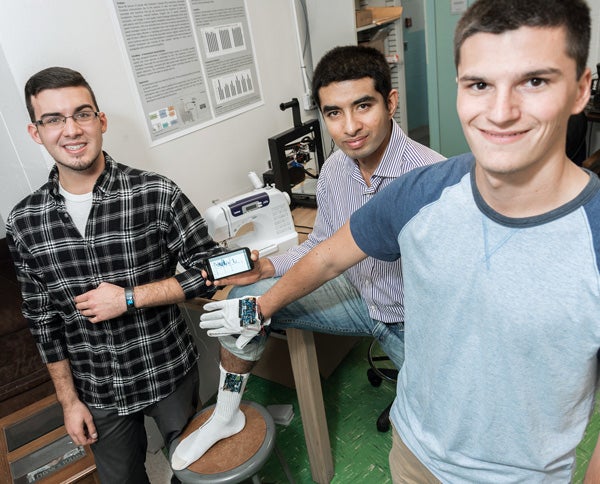Smart Gloves May Monitor Parkinson’s Disease

Prescribing a medication plan for a patient with Parkinson’s disease is a big challenge for doctors, but biomedical engineering professor Kunal Mankodiya, director of URI’s Wearable Biosensing Laboratory, and his students are researching how to transform gloves, socks, clothing and even shoes into high-tech items that will make people healthier—and improve their lives.
“We are in the era of game-changing technology, especially in health care,’’ says Mankodiya. “URI’s College of Engineering is pioneering new medical devices that will change the way people receive medical care.’’
Mankodiya’s research focuses on smart textiles—wearable items embedded with sensors, electronics and software that can collect data from patients, even though they are at home, and deliver it to doctors. That allows doctors to make more informed decisions remotely, and patients to be more involved with their care.
The gloves are embedded with sensors on the fingers and thumb that measure tremors and rigidity—common symptoms of Parkinson’s. Data is sent through cell phones to neurologists, who can then adjust treatment plans on a day-to-day basis—ensuring that medication is working properly and eliminating the need for patients to make so many stressful clinical visits.
“Patients with Parkinson’s face many mobility issues—driving and even walking long distances,’’ Mankodiya says. “The gloves will give patients the option of receiving health care while at home, and also reduce the risk of falls and other accidents.’’
Mankodiya is also working on high-tech socks for people who have suffered strokes and smartwatches for patients with psychiatric illnesses and autism.
Photo: Michael Salerno
 Home
Home Browse
Browse Close
Close Events
Events Maps
Maps Email
Email Brightspace
Brightspace eCampus
eCampus


